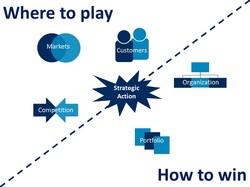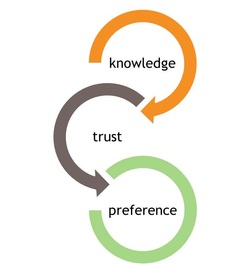Online Concept Development

Developing a concept sounds like great fun (which, it is), but it also takes a lot of brain power. Ultimately, it's about trying to match a real need with a concrete proposition. That's where the business is. Starting from an identifiable problem you work your way back to how your business can solve the problem. Sound easy? Think about this: what is the core customer need driving the practical problem? How many customers have this problem? Can we segment them? How do we translate customer needs to product features? Can we actually create such a product? What price would people be willing to pay for such a product? Is the entire effort economical?
That's what I like to figure out! Especially when we're talking online audiences and propositions.
That's what I like to figure out! Especially when we're talking online audiences and propositions.
Business Strategy

Where to play and how to win. That's strategy. Where to play is about identifying the markets you want to operate in. These markets are defined by customers and competitors. But also by other dynamics such as regulations.
Once you've identified where you're going to compete, the key question is how you are going to win. First of all, with your propositions. The products you hold in your portfolio that carry real Unique Selling Points (USP's). Second, your organization (people!) beat your competitors because they are more talented and motivated and better equipped.
Combined, the decisions you make on these factors (market, customers, competition, protfolio and organization) define your strategy. Think your done? Nope. You need to execute. And that's where the men (or women) are seperated from the boys (or girls). Succesful strategies have 1 clear feature: they are delivered!
Once you've identified where you're going to compete, the key question is how you are going to win. First of all, with your propositions. The products you hold in your portfolio that carry real Unique Selling Points (USP's). Second, your organization (people!) beat your competitors because they are more talented and motivated and better equipped.
Combined, the decisions you make on these factors (market, customers, competition, protfolio and organization) define your strategy. Think your done? Nope. You need to execute. And that's where the men (or women) are seperated from the boys (or girls). Succesful strategies have 1 clear feature: they are delivered!
Content Marketing

"To me, a brand is trust." These are the words of Steve Jobs, Apple's late and great CEO. The only way a brand can set itself apart from competitors. For many businesses, the aquired skills and knowledge are their most valued asset. From a customer perspective, this knowledge drives trust. And when customers trust you, they will prefer your business and brand to the next.
Content marketing is a marketing technique of creating and distributing relevant and valuable content to attract, acquire, and engage a clearly defined and understood target audience - with the objective of driving profitable customer action.* It's a relatively new form of marketing, where advertisers start behaving like publishers. And rightly so: content marketing has the potential of developing a longer lasting relationship with prospects and customers and drive better return-on-marketing-investment. Interested? Take a look at this white paper on content marketing I wrote.
Content marketing is a marketing technique of creating and distributing relevant and valuable content to attract, acquire, and engage a clearly defined and understood target audience - with the objective of driving profitable customer action.* It's a relatively new form of marketing, where advertisers start behaving like publishers. And rightly so: content marketing has the potential of developing a longer lasting relationship with prospects and customers and drive better return-on-marketing-investment. Interested? Take a look at this white paper on content marketing I wrote.
Program Management

Programs and projects are a great way to move your business. In an ideal world they deliver on target and under budget. More pragmatically, however, programs should simply provide a sense of continuous, significant progress. Are we better than last week? What are we doing this week to be better next week? Those are the questions I like to ask.
Furthermore, programs and projects help identify talent and stimulate entrepreneurship and drive growth. They should propel business forward, not bog them down.
Granularity is the key word: divide complex matters into clearly defined and independent activity streams. So that failure to achieve progress in one activity stream, does not impact another stream.
Furthermore, programs and projects help identify talent and stimulate entrepreneurship and drive growth. They should propel business forward, not bog them down.
Granularity is the key word: divide complex matters into clearly defined and independent activity streams. So that failure to achieve progress in one activity stream, does not impact another stream.
